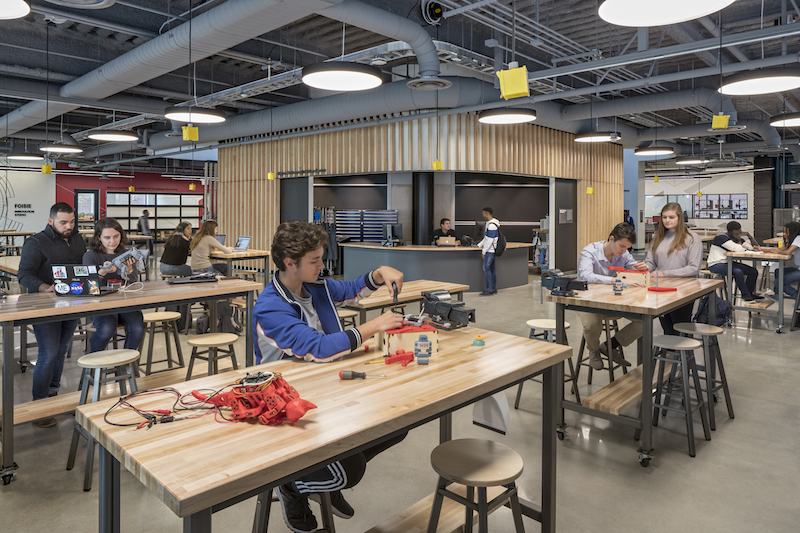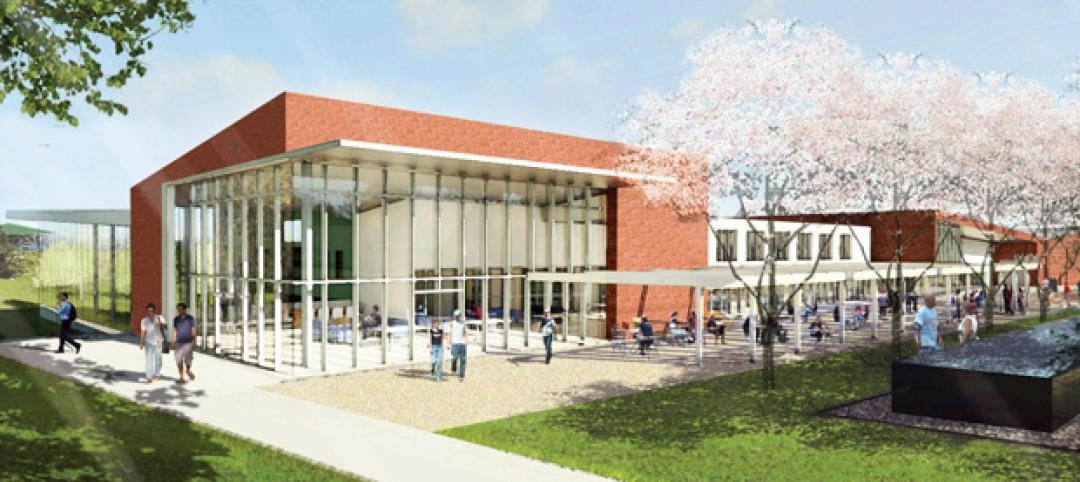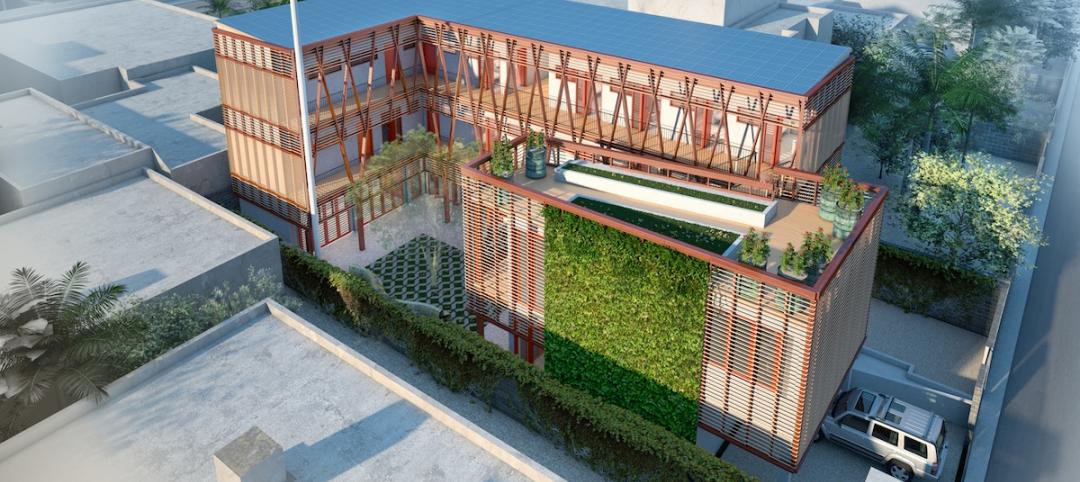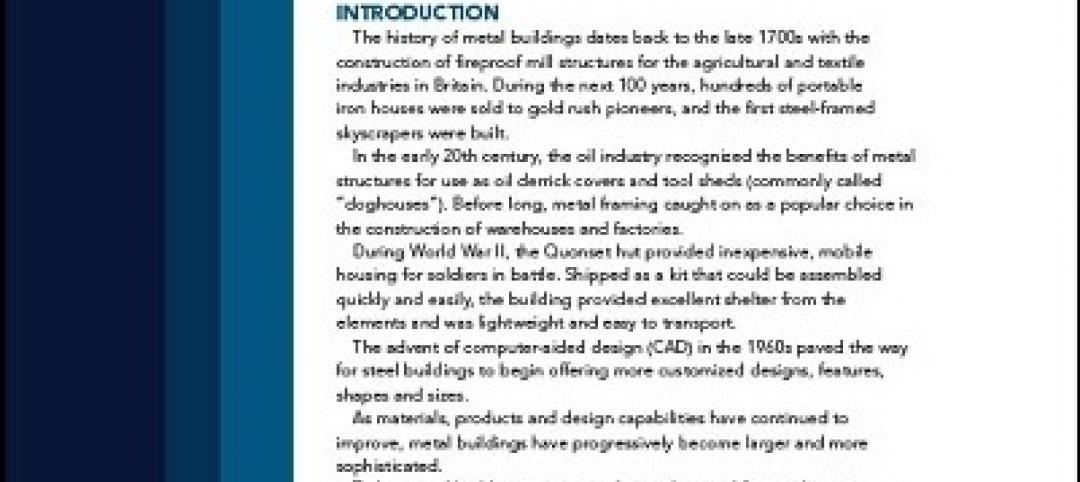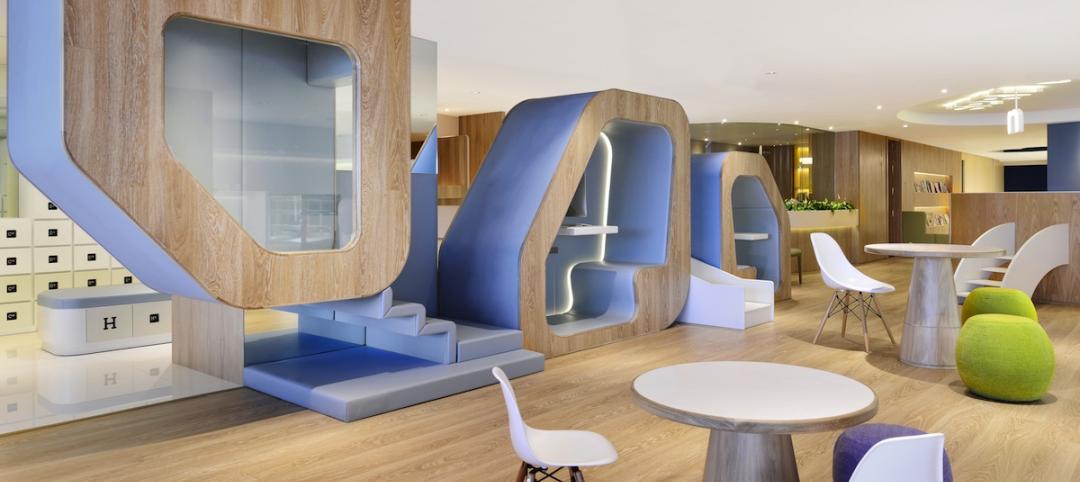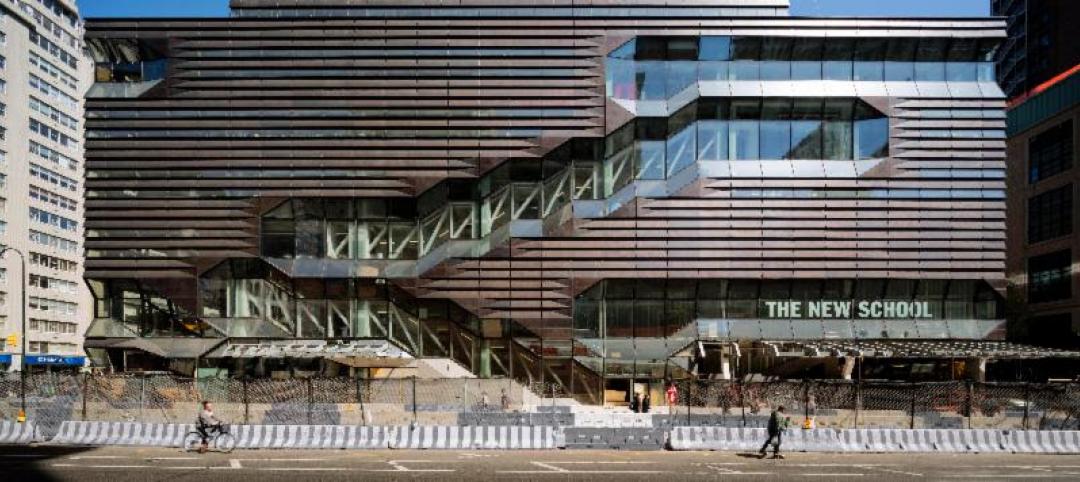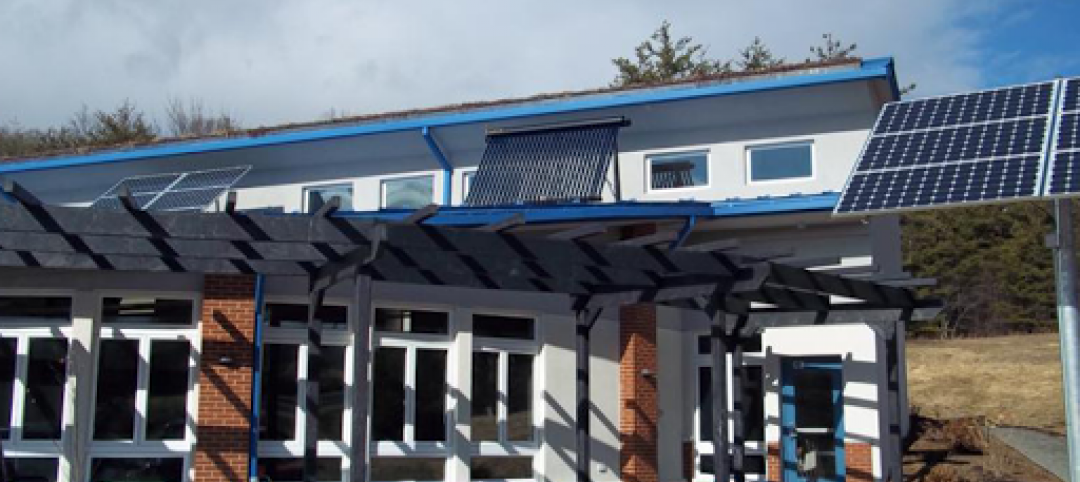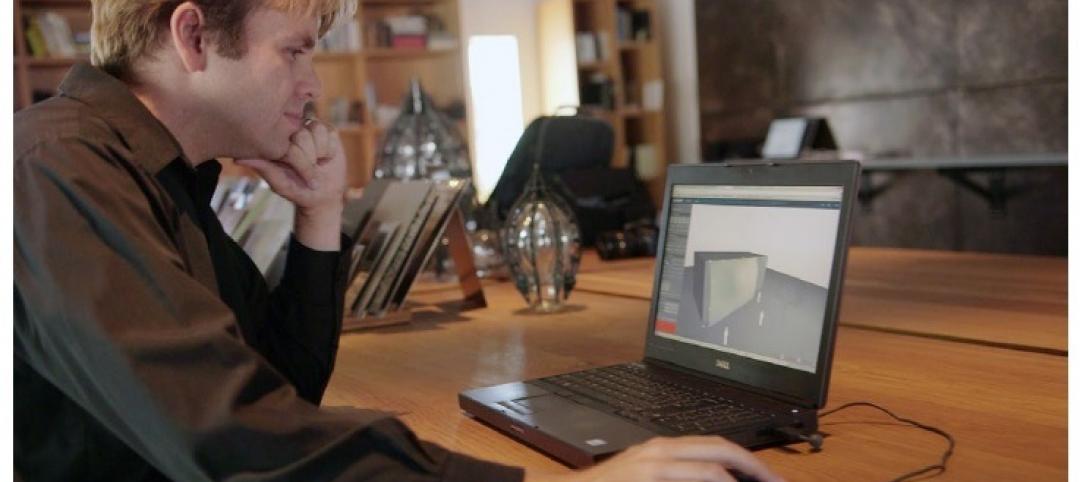Late last month, construction was completed on the $47.7 million Foisie Innovation Studio and Messenger Residence Hall on the campus of Worcester (Mass.) Polytechnic Institute.
The 78,000-sf residential and classroom facility was funded through an alumni-led campaign that raised more than $18 million. The building is named after Robert Foisie and Priscilla and George Messenger Jr., who were instrumental in raising money for student scholarships.
The three-floor residence hall, with 140 beds in single and double rooms, sits atop the two-floor innovation studio that is intended for student project work. It includes a variety of academic spaces that range from high-tech classrooms to an innovation and entrepreneur center. There’s also a robotics and “global impact” lab, makerspace, technology suites, and business incubators.
The building is the embodiment of “the modern WPI plan,” according to the Institute’s President Laurie Leshin. That plan, which was launched in 1970, revolves around a project-oriented curriculum that blends classroom learning with hands-on, real-world experience.
Instead of semesters, WPI’s academic year consists of four seven-week terms, during which students take three courses per term that emphasize collaboration. Students select the courses they take, and WPI has eliminated failing grades so that students can focus on learning and teamwork instead of competition. First-year students can opt for a two-term Great Problems Seminar that explores topics such as public health and security, and devises potential solutions. The curriculum offers an Interactive Qualifying Project, which allows students to engage in sponsored projects. A significant portion of senior year is devoted to the Major Qualifying Project, often completed with corporate sponsors, where students demonstrate their research, design, and problem-solving skills.
“The driving force behind this project was a need to create a space that helps spark new opportunities and drive student innovation. Our team’s expertise allowed for continued construction over a two-year period, without disturbing the busy campus setting,” said Ron Simoneau, vice president at Shawmut Design and Construction, which completed this project in collaboration with Gensler, which worked with Arup on the building’s design. (On its website, Arup points out that several of its staff members are WPI alumni.)
The Building Team broke ground in May 2016 and WPI held a ribbon-cutting ceremony for the building’s opening last fall.
Different spaces within the building are named after numerous university benefactors.
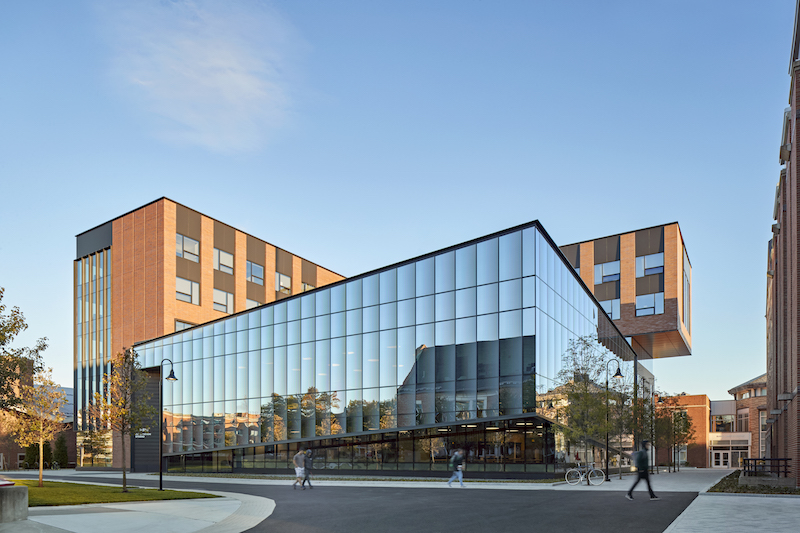 The 78,000-sf building is targeting LEED Gold certification. Image: Robert Benson Photography
The 78,000-sf building is targeting LEED Gold certification. Image: Robert Benson Photography
The building is targeting LEED Gold certification. Daylight is optimized with the installation of a very low 0.48 watts-sf lighting power density system (56% below the lighting code’s baseline). The project team also designed this facility for an almost 50% reduction in energy costs, partly by creating as building envelope for which insulation exceeded the prescriptive code value. Demand-controlled ventilation in academic areas and ducted fresh air into the dorm produce higher air quality.
By using drip irrigation and plants that require less water, the building’s outdoor area is targeting a reduction in its potable water use for landscape by 54%.
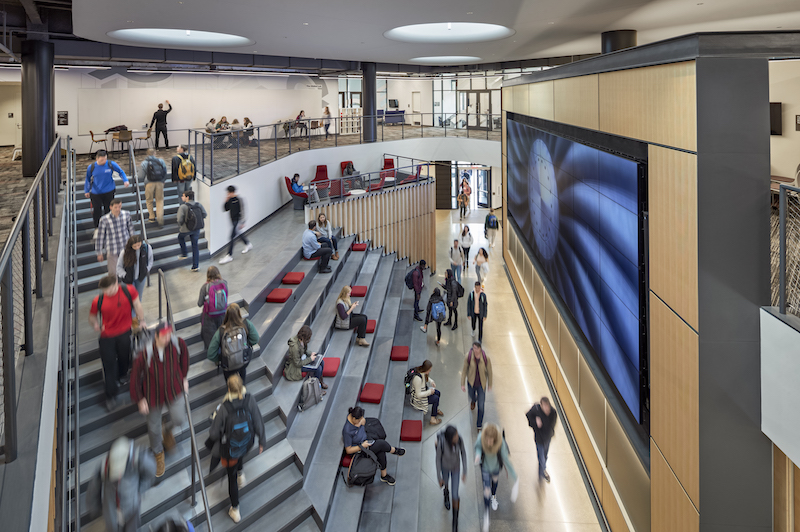 A large stairwell doubles as a meeting place inside the building. Image: Robert Benson Photography
A large stairwell doubles as a meeting place inside the building. Image: Robert Benson Photography
Shawmut’s work on WPI’s Foisie Innovation Studio and Messenger Residence Hall represents the latest in the firm’s academic portfolio, with current projects at Harvard University, Tufts University, and Brown University.
Related Stories
| Jan 31, 2014
6 considerations for rehabbing student union buildings
Most colleges and universities feel pressure to offer the latest amenities in order to attract and retain the best and brightest students. While hauling in the bulldozer to create modern facilities is attractive in some regards, deciding to renovate can be just as effective and, in some cases, even preferable to new construction.
| Jan 30, 2014
How reverse engineering nature can spur design innovation
It’s not enough to copy nature. Today’s designers need a deeper understanding of environmental nuance, from the biome in.
| Jan 29, 2014
Notre Dame to expand football stadium in largest project in school history
The $400 million Campus Crossroads Project will add more than 750,000 sf of academic, student life, and athletic space in three new buildings attached to the school's iconic football stadium.
| Jan 28, 2014
White Paper: How metal buildings deliver long-term value to schools
A new white paper from Star Building Systems outlines the benefits of metal buildings for public and private school building projects.
| Jan 28, 2014
16 awe-inspiring interior designs from around the world [slideshow]
The International Interior Design Association released the winners of its 4th Annual Global Excellence Awards. Here's a recap of the winning projects.
| Jan 28, 2014
Big Ten Conference opens swanky HQ and museum [slideshow]
The new mixed-use headquarters includes a museum, broadcast studios, conference facilities, office spaces, and, oh yeah, a Brazilian steakhouse.
| Jan 22, 2014
SOM-designed University Center uses 'sky quads,' stacked staircases to promote chance encounters
The New School's vertical campus in Manhattan houses multiple functions, including labs, design studios, a library, and student residences, in a 16-story building.
| Jan 17, 2014
The Starchitect of Oz: New Gehry building in Sydney celebrates topping out
The Dr. Chau Chak Wing Building at the University of Technology, Sydney, will mark Frank Gehry's debut project in the Australian metro.
| Jan 15, 2014
Report: 32 U.S. buildings have been verified as net-zero energy performers
The New Buildings Institute's 2014 Getting to Zero Status report includes an interactive map detailing the net-zero energy buildings that have been verified by NBI.
| Jan 13, 2014
Custom exterior fabricator A. Zahner unveils free façade design software for architects
The web-based tool uses the company's factory floor like "a massive rapid prototype machine,” allowing designers to manipulate designs on the fly based on cost and other factors, according to CEO/President Bill Zahner.


